
Tēnā Koutou Kātoa
Ngā mihi nui o te wā
It’s hard to believe we are already nearing the end of another school year. I know you and your team have worked hard to ensure our tamariki are set up for success as they continue on their school journey. I want to pass on my heartfelt thanks to you all for welcoming our Evaluation Partners, Toki Ao Marama and Leadership Partners to your schools and kura, as we work alongside you to improve learner outcomes.
Over the course of this year, we have made some adjustments to our evaluations and reporting and introduced some new tools and resources. Some things haven’t changed, and we hold firm to our whakataukī, ko te tamaiti te pūtake o te kaupapa – the child, the heart of the matter.
Every child, in every community, deserves the best education to set them up for future success. We work closely with every school and kura to foster discussions about how we can collectively drive improved learner outcomes. We know from these conversations that lifting achievement in mathematics, reading, and writing, using assessments effectively, and ensuring high levels of attendance are important to schools. We will have a deliberate focus on these priorities in our work together.
Our school reports play an important part in improving education outcomes, giving parents and whānau the information they need to be active partners in their children's learning. To better inform whānau, we are updating our reporting to parents to provide clear and useful information. We’ll be reporting on attendance and achievement across your school, your school’s use of assessment, and if progress is accelerated for those at risk of falling behind. There’s more about our reporting changes in this newsletter.
One of our newest tools, the Teaching Observation Framework (TOF) is currently being trialed in a group of schools and will be introduced as part of our review process from next year. The TOF will be used by you and your ERO Evaluation Partner to make judgements about where your school sits in the Teaching and Learning domain of the School Improvement Framework. You’ll find more information about the TOF and how you can use it in your school in this newsletter.
Also in this edition, we outline our new streamlined Board Assurance Statement, how we’ll work with charter schools, as well as the latest education research from our evidence and insights team. You'll also find links to two articles written by our Chief Review Officer, Nicholas Pole, that focus on strategies to support you as you navigate change through 2025.
We welcome feedback from you at any time. Please make contact with your Evaluation Partner if you have questions or comments for us at ERO.
I hope you and your team have a very Merry Christmas, and we look forward to working with you in the new year.

Ngā mihi,
Deborah Wood
Deputy Chief Executive
Review and improvement
In this newsletter:
- Small shifts in our shared evaluation focus
- Reporting changes
- Supporting you as you implement curriculum and assessment changes
- Introducing the Teaching Observation Framework
- Great news! We’ve simplified the Board Assurance Statement
- Meet Sharee Hemingway, Director Ākonga Māori
- Partnering schools with Evaluation Partners
- Post Review Questionnaire
- Charter schools and our role
- Phones away and teaching reading, writing and mathematics for an hour a day requirement
- Insights from the Chief Review Officer, Nicholas Pole
- ERO’s evidence and insights
Small shifts in our shared evaluation focus
We continue to work collaboratively alongside you, using our Te Ara Huarau evaluation approach to focus on what is working well and what needs improvement.
We are making small shifts in our shared evaluation focus, so our reviews have a stronger focus on areas of learner success and wellbeing, including attendance, assessment, achievement, and progress.
We are interested in:
- how you are supporting high levels of attendance for all learners and what the plan is to raise attendance
- how well students are achieving and making progress in reading, writing and mathematics, and what the plans and targets are to support all learners to experience success over time
- the quality of assessment practices used to determine learner achievement and progress, how information is used, and how planning for standardised assessment requirements is being considered.
Your Evaluation Partner will discuss this with you as part of your evaluation.
Reporting changes
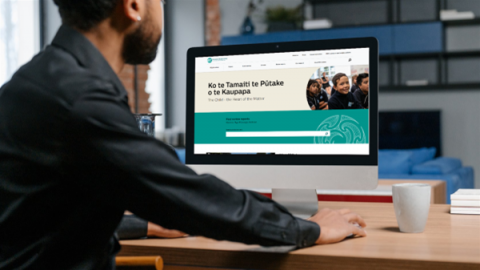
We are making changes to our public reports for schools.
The new school report is designed to be more parent-friendly, so parents and whānau can have the information they need to be active partners in their children’s learning.
The report starts with a parent summary about learner success and wellbeing, attendance, assessment, achievement, and progress. The report also includes a summary about the quality of teaching and learning through the provision of te reo Māori in rumaki and bilingual classrooms, where appropriate.
School leaders will see that the report then sets out our evaluation findings, key priorities and actions for you to use as part of your strategic and annual planning for ongoing improvement.
The final part of the report summarises the school board’s attestation to meeting legislative and regulatory requirements, as well as provision for international and hostel students, if appropriate.
We are testing our reports in full and contributing primary and intermediate schools this term and with parents in Term 1 next year, seeking feedback to ensure they are useful and clear.
As part of our regular evaluation process, you will receive a copy of the unconfirmed report to comment on, before the report is confirmed and published on our website.
Supporting you as you implement curriculum and assessment changes
We are asking schools with students in Years 1-8 about how you are preparing to implement the curriculum and assessment changes for NZC and TMOA and a structured approach to teaching these learning areas (English Year 0 to 6, Te Reo Rangatira and Mathematics and Statistics Years 0 to 8 and Pāngarau).
We are keen to know what further support you might need to successfully get started and implement structured literacy and mathematics approaches. Some schools may need more support than others. If your school needs a higher level of support, we will recommend that the Ministry of Education provides this additional support.
How we are working with the Ministry of Education
We are working closely with the Ministry of Education to make sure that schools that need additional support receive it in a timely way.
As we gather information about the successes and challenges you are having as you get ready and begin to implement curriculum and assessment changes, we will ensure that schools aren’t asked the same questions by both agencies.
We will ensure that you experience clear and consistent communication from ERO and the Ministry, so everyone has the same understanding about what each agency is responsible for and how we are each working alongside schools during the roll-out.
Introducing the Teaching Observation Framework

Effective teaching practice is key to learner engagement, achievement and progress.
To help schools identify effective teaching practice and recognise any shifts that might be needed in classrooms, we have developed a new tool that you can use as part of your own internal self-evaluation, and alongside your ERO Evaluation Partner.
The Teaching Observation Framework (TOF) will be used by you in conjunction with our Evaluation Partners to make observations about teaching practice in your school. It’s important to be clear that this observation is focused on the teaching, not the teacher.
The TOF will support you in your self-evaluation and help you and your Evaluation Partner to make judgements about where your school sits in the Teaching and Learning domain of the School Improvement Framework (SIF). This also means that our SIF judgements for this domain will be consistent across the motu.
We have continued to trial the TOF in Term 4 with some schools. Feedback from the trial will help us to refine the framework, ready for all schools to use from next year.
Great news! We’ve simplified the Board Assurance Statement
In good news for your school board, our Board Assurance Statement (BAS) has been streamlined, so that it is simpler and easier to use.
Board members will be pleased to see that we have reduced the number of topics in the self-audit checklist from 103 to 41, with a strong focus on health and safety, and the National Education and Learning Priorities (NELP). It means that school boards will have a clearer view on whether they are meeting their legal obligations.
You’ll find the refreshed BAS on our website very soon!
Meet Sharee Hemingway, ERO's Director Ākonga Māori

Sharee Hemingway is committed to helping ERO achieve its ambition of Māori enjoying and achieving education success as Māori.
As ERO’s Director Ākonga Māori, she is responsible for the programme of evaluation work in schools with Māori-medium rumaki and bilingual units across Aotearoa New Zealand and is accountable for the consistency of ERO’s monitoring of Māori achievement in English-medium settings, including methodologies and evaluative practices.
Sharee contributed to the development of Poutama Reo, ERO’s self-evaluation tool to support improvement in te reo Māori provision in English-medium schools and was previously Toki Ngao Tū, Manager of Te Pou Reo.
Sharee is an educator at heart. Prior to coming to ERO, Sharee worked in education, spanning primary, secondary and tertiary. She has also worked within the Ministry of Education’s Te Poutāhū Curriculum Centre as an advisor, and in the private education sector in Australia.
Partnering schools with Evaluation Partners
Some schools have recently received a notification from us to advise of a change of ERO Evaluation Partner.
Where we’ve made changes, we have done our best to ensure that the Evaluation Partner you’ll be working with has the skill set that best supports your school, and your Māori immersion learning space, if you have one.
Post Review Questionnaire

We have changed the timing of our Post Review Questionnaire (PRQ), so that schools receive the PRQ at the same time as you receive your confirmed report. This means that we can get feedback from you sooner, giving us useful insights into how well our evaluation has supported your school.
Charter schools and our role
You may be wondering what role ERO will have in charter schools. We will have a monitoring and reporting function in charter schools, as we do in all schools and kura across Aotearoa New Zealand.
Our initial role is to share our insights with the Charter Schools Agency on the performance of public schools that apply to become charter schools.
We will also check that new entities applying to be charter schools have key health and safety and personnel policies and procedures in place to ensure the safety of students.
Phones away and teaching reading, writing and mathematics for an hour a day requirement

Since the student phone rules and hour a day of reading, writing and mathematics requirements came into force, we have verified, through regular review cycle compliance checks, that schools have policies or procedures in place to ensure the requirements are being carried out.
What's next? In 2025, we will begin evaluating the impact these requirements are having on student outcomes.
Insights from the Chief Review Officer, Nicholas Pole
Nick is writing a series of articles that focus on strategies to support leaders and teachers to successfully introduce, navigate and implement revised curriculum expectations, grow the use of assessment data and embed the associated shifts in teaching practices.
Article 1: School leaders leading change
Leading change is a crucial responsibility for school leaders, and 2025 is poised to be a pivotal year for all of us.
To positively impact classrooms and student learning requires a planned change process. Establishing the necessary structures to support ongoing change and improvement should form part of the school's routine practices. To sustain these shifts, schools need to adopt a strategic and evidence-based approach to implementing change.
The new English and mathematics / Pāngarau and Te Reo Rangatira curricula provide an opportunity for school leaders to revisit their school’s approach to professional development and teacher inquiry.
ERO’s research shows highly effective schools, leaders and teachers are those that work collectively to build knowledge, collaboratively solve problems, seek to achieve shared goals, provide mutual support, and embed a culture of continuous improvement and collective efficacy.
Read the full article on our website: Professional Learning Communities in Support of the Curriculum Implementation | Education Review Office. This article urges schools to proactively plan for the upcoming curriculum changes by:
- Establishing or strengthening PLCs as a key strategy for implementation.
- Determining the necessary systems and structures for the beginning of the year
- Identifying data-informed strategic priorities for PLCs to focus on.
- Developing a plan to evaluate the impact of PLC efforts on student outcomes.
Article 2: Preparing for a differentiated approach to curriculum implementation in the classroom
Implementing the 2025 curriculum changes in classrooms will require leaders and teachers to think carefully about how they will approach curriculum delivery and teaching.
In many New Zealand schools, composite classes of two-or-more year levels add complexities to planning, teaching and assessment to respond to the needs of every learner. Now is the time to consider how implementing the refreshed curriculum can strengthen differentiated teaching and learning in your school.
Differentiation is the process used to maximise student learning by matching the students’ individual needs and the curriculum. Teaching environments and practices are tailored to create appropriately different learning experiences for different students.
In this article Nick outlines why differentiation matters. He breaks down four key considerations when looking to meet the differentiated needs of your learners with key evidence and insights from ERO and others.
The article is designed to provide insight and practical tools to inform your differentiation approach through:
- knowing your learners
- identifying areas for learner progress
- choosing your strategies, and
- knowing how effective your practices are.
ERO’s latest research
It has been a busy time for ERO’s research centre – and you may have seen our recent reports pop up in the news recently. Below we highlight some of our newest research and insights, which can be found on our dedicated evidence website: https://evidence.ero.govt.nz/
We also regularly share news, links, and sneak peeks through our dedicated research social media accounts. Look for ‘Te Ihuwaka Education Evaluation Centre’ on Facebook, LinkedIn, and Instagram.
Set up to succeed: How well is NCEA Level 1 working for our schools and students?
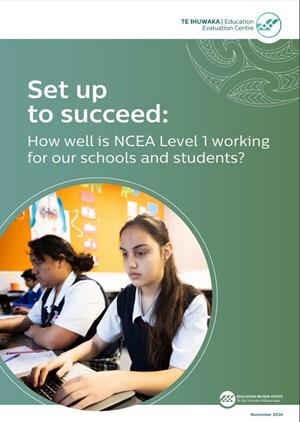
Leaving school with a qualification leads to better life outcomes, so ensuring Aotearoa New Zealand’s qualifications work well is essential for the success of our young people.
ERO reviewed NCEA Level 1 to find out how fair and reliable it is, if it is helping students make good choices, how motivating and manageable it is for students, and the impacts of recent changes. We also explored how valued it is and how implementation has gone so far.
Left behind: How do we get our chronically absent students back to school?
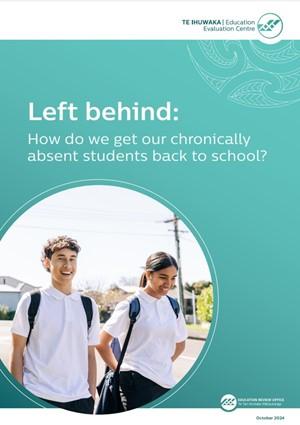
Chronic absence has doubled in the last decade. In Term 2 this year, over 80,000 students missed more than three weeks of school. These chronically absent students (at school 70 percent or less of the time) are often struggling and are at high risk of poor education and lifetime outcomes. ERO looked at how good the education system and supports are for chronic absence in Aotearoa New Zealand and found that we do not have a strong enough system or effective supports to address chronic absence.
Someone to talk to: Evaluation of Counselling in Schools
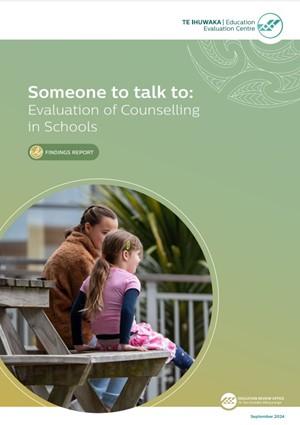
Students’ mental health is strongly linked to their engagement, achievement, and school attendance. Counselling in Schools is an initiative which began in 2021 with the aim of providing evidence-based counselling support in primary, intermediate, and small secondary schools, to help young people thrive at school. ERO looked at the effectiveness of Counselling in Schools, how well it reached the students it is targeted at, the impact it had, and some lessons for counselling programmes in the future.
Let's keep talking: Oral language development in the early years
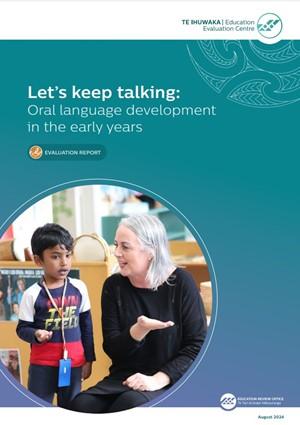
Language is the foundation for children’s learning and success. Children use oral language to become good thinkers and communicators, and to develop the literacy skills they need to achieve well in school and beyond.
ERO looked at how Early Childhood Education can help children to develop these important skills. Read our report here. Alongside this, we have developed a short, practical guide for new entrant teachers, and one that schools can share with parents and whānau too. These were developed with new entrant teachers.
New entrant teachers’ guide: https://tinyurl.com/4jzzes7e
Parent and whānau guide: https://tinyurl.com/55nrt35r
All of our reports and guides can now be found more easily on www.evidence.ero.govt.nz.

For more information about ERO and our mahi please visit ero.govt.nz
To be added to our mailing list for Sharing the mahi, please email us at ricomms@ero.govt.nz